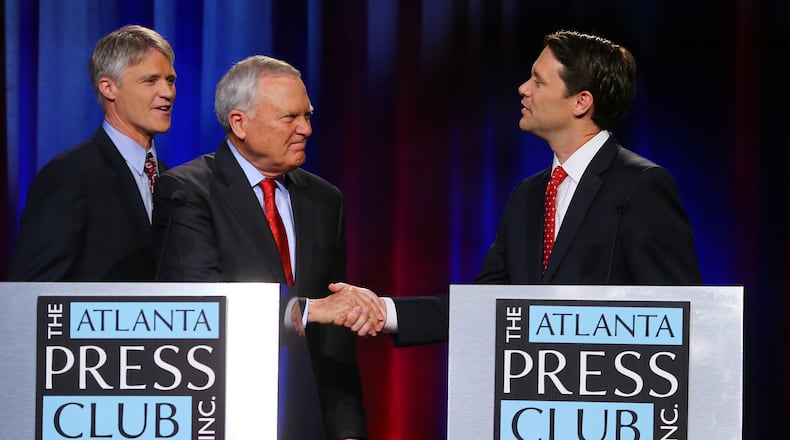For months, Gov. Nathan Deal and Democrat Jason Carter have traded barbs over education and economic policy. But at Sunday’s debate, both rivals unleashed new attacks that focused more on their rival’s personal backgrounds than their policy positions as they intensified their appeal to the middle class.
In the testy showdown at the Atlanta Press Club, Deal called Carter a “liberal” who had a skewed view of private enterprise, and he tried to paint the state senator as a novice who’s had little private-sector or political success. Carter accused Deal of failing to tap Georgia’s potential with a humdrum political agenda, and he raised questions about the governor’s sale of a lucrative salvage yard.
Deal was forced on the defensive through stretches of the hourlong debate, as Carter and Libertarian Andrew Hunt spent much of their time criticizing the governor’s leadership. At one point, when Carter was asked about whether he’d support legislation inspired by Georgia tailback Todd Gurley’s suspension, the Democrat pivoted to an attack on the governor’s higher education policy.
The governor pushed back on each broadside, saying Georgia was on the right track and that he would resume the course in the next four years. When pressed by Carter about the state’s stubborn unemployment rates — pegged at 7.9 percent for September — the governor called it an “outlier” statistic.
“Unemployment rates are only good for political advertising,” Deal said. “Economists don’t pay any attention to them.”
Experience and change
The bitter back-and-forth played out against months of campaign rhetoric focusing on education and the economy, the two dominant themes of this election. Deal touts more than 300,000 jobs created on his watch and an education budget this year that includes more than $300 million in new k-12 money. Carter said the state is drowning in wasted potential that he can unlock with a pledge to boost classroom funding.
The sharpest attacks on Sunday, though, came over less lofty policy platforms. Early in the debate, Deal panned Carter as a two-term state senator who had little to show for his time in the statehouse.
“You’ve never passed a bill. Never offered an amendment to many of the bills you now are criticizing,” he said. “Why should Georgians vote for you with this absolute lack of leadership experience?”
Carter, in a curt response, said the attack was misguided.
“There are 21 bipartisan bills that have my name on them, that you signed into law,” Carter said. “And at the same time, the attacks on my leadership are frankly just an attempt, I believe, to pass the buck.”
Deal later defended the 2013 sale of a salvage yard he co-owned to a Texas-based firm locked in a dispute with the state over as much as $74 million in back taxes. He called a TV ad by Carter's campaign deriding the sale as a "typical illustration of the way that some liberals look at private enterprise."
“I do not agree with the proposition that the government made our business successful,” Deal said, adding: “It is not the government that made us successful. It is those of us who worked to make our companies successful.”
The Democrat shot back, invoking Deal's resignation from the U.S. House that ended an ethics probe into the salvage yard.
“This exact business is the business that Governor Deal was using his position in Congress to make better,” Carter said. “He was run out of Congress to avoid an ethics scandal. It is a pattern. It is a practice.”
Ebola surfaces
The three candidates also sparred over whether Georgia is properly prepared for a possible Ebola case, as Deal's rivals criticized him for telling a newspaper last week that "water kills the Ebola virus." Both were eager to remind a television audience of those remarks on Sunday.
Hunt, a technology entrepreneur, said Deal lacks the firsthand knowledge to lead Georgia’s response. And Carter said his experience working in the Peace Corps in South Africa during disease outbreaks would serve him well.
Deal, for his part, said he was “misinformed” by his public health commissioner. Minutes before the debate, he appointed a task force to formulate the state’s response to the deadly virus.
When the debate spun back to Georgia’s economy, Carter asked Deal why he shouldn’t be fired for presiding over a state that, in August, had the nation’s highest unemployment rate. The governor offered a sunny take on the economy’s future.
“We continue to grow,” he said, adding: “We are on the right track. I think that what you’re simply saying is quoting statistics that have no relevance.”
Carter accused his opponent of passing the buck.
“I don’t believe this is about statistics, governor,” he said. “I don’t think the governor can blame statisticians for the fact that the middle class is hurting.”
About the Author
Keep Reading
The Latest
Featured




